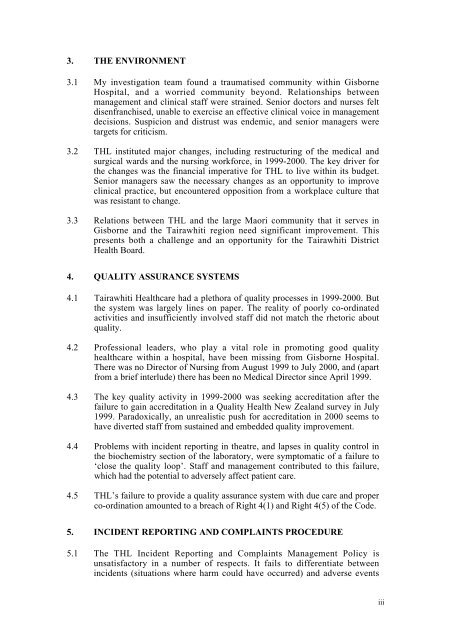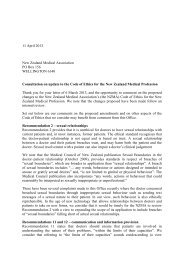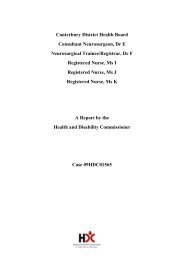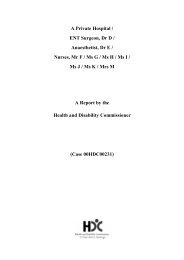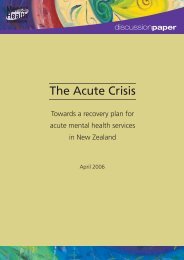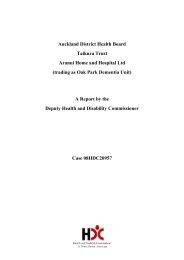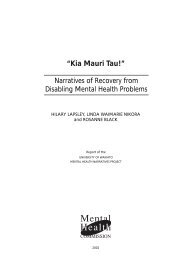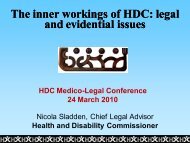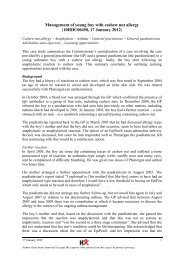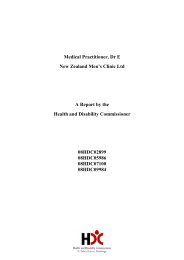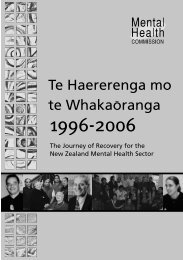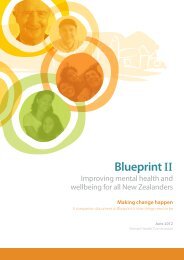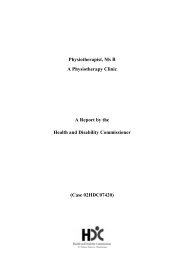Gisborne Hospital Report - Health and Disability Commissioner
Gisborne Hospital Report - Health and Disability Commissioner
Gisborne Hospital Report - Health and Disability Commissioner
Create successful ePaper yourself
Turn your PDF publications into a flip-book with our unique Google optimized e-Paper software.
3. THE ENVIRONMENT<br />
3.1 My investigation team found a traumatised community within <strong>Gisborne</strong><br />
<strong>Hospital</strong>, <strong>and</strong> a worried community beyond. Relationships between<br />
management <strong>and</strong> clinical staff were strained. Senior doctors <strong>and</strong> nurses felt<br />
disenfranchised, unable to exercise an effective clinical voice in management<br />
decisions. Suspicion <strong>and</strong> distrust was endemic, <strong>and</strong> senior managers were<br />
targets for criticism.<br />
3.2 THL instituted major changes, including restructuring of the medical <strong>and</strong><br />
surgical wards <strong>and</strong> the nursing workforce, in 1999-2000. The key driver for<br />
the changes was the financial imperative for THL to live within its budget.<br />
Senior managers saw the necessary changes as an opportunity to improve<br />
clinical practice, but encountered opposition from a workplace culture that<br />
was resistant to change.<br />
3.3 Relations between THL <strong>and</strong> the large Maori community that it serves in<br />
<strong>Gisborne</strong> <strong>and</strong> the Tairawhiti region need significant improvement. This<br />
presents both a challenge <strong>and</strong> an opportunity for the Tairawhiti District<br />
<strong>Health</strong> Board.<br />
4. QUALITY ASSURANCE SYSTEMS<br />
4.1 Tairawhiti <strong>Health</strong>care had a plethora of quality processes in 1999-2000. But<br />
the system was largely lines on paper. The reality of poorly co-ordinated<br />
activities <strong>and</strong> insufficiently involved staff did not match the rhetoric about<br />
quality.<br />
4.2 Professional leaders, who play a vital role in promoting good quality<br />
healthcare within a hospital, have been missing from <strong>Gisborne</strong> <strong>Hospital</strong>.<br />
There was no Director of Nursing from August 1999 to July 2000, <strong>and</strong> (apart<br />
from a brief interlude) there has been no Medical Director since April 1999.<br />
4.3 The key quality activity in 1999-2000 was seeking accreditation after the<br />
failure to gain accreditation in a Quality <strong>Health</strong> New Zeal<strong>and</strong> survey in July<br />
1999. Paradoxically, an unrealistic push for accreditation in 2000 seems to<br />
have diverted staff from sustained <strong>and</strong> embedded quality improvement.<br />
4.4 Problems with incident reporting in theatre, <strong>and</strong> lapses in quality control in<br />
the biochemistry section of the laboratory, were symptomatic of a failure to<br />
‘close the quality loop’. Staff <strong>and</strong> management contributed to this failure,<br />
which had the potential to adversely affect patient care.<br />
4.5 THL’s failure to provide a quality assurance system with due care <strong>and</strong> proper<br />
co-ordination amounted to a breach of Right 4(1) <strong>and</strong> Right 4(5) of the Code.<br />
5. INCIDENT REPORTING AND COMPLAINTS PROCEDURE<br />
5.1 The THL Incident <strong>Report</strong>ing <strong>and</strong> Complaints Management Policy is<br />
unsatisfactory in a number of respects. It fails to differentiate between<br />
incidents (situations where harm could have occurred) <strong>and</strong> adverse events<br />
iii


